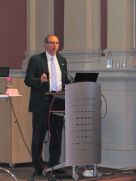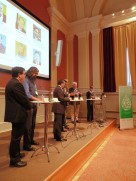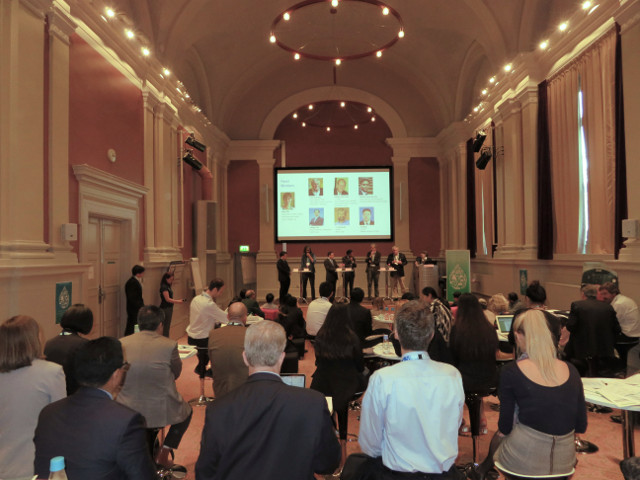The 1.5 hr Session consists of a short part of presentations, facilitated by Steven Downey, Head of Communications & Knowledge Management of GWP, and a free dialogue between panel and audiences, mainly developed by Francois Brikké, Senior Network Officer & Urban Water Security Focal Point of GWP. The interaction covers political, technical and academic aspects, innovative and challenging. Dr. Ke Wang, Lecturer of the Renmin University of China, expressed as “The urbanization in China raises the attention of climate adaptation plan to low carbon, particularly non-dioxide carbon. The adjustment scheme, therefore, emphasizes on the control over the greenhouse gas emitted by urban waste water treatment. Better management of municipal wastewater could bring about synergies, e.g., emission reduction as well as more funding resources in this regard. Upon such optimizations, we will have more livable cities in China”.



(L-R) Steven Downey; Technical Papers of GWP; Panel Members of the Session
Both the panel and audiences agreed that waste--energy approaches help cities address a multitude of escalating problems, as wastewater management, public health, sanitation, power consumption due to waste treatment and climate change.
The opening speech of Prof Yunzhong Jiang, Secretary General of the GWP China Region, referred to proactive wastewater development in China for the sake of high political supports as “the Three Red Lines” and “Water Ten,” with remarkable outcomes. “From 2011 to 2016, urban sewage treatment factories increased from 1588 to 2039, raising at a rate of 28%”, said Jiang, “the recycled water has immense potential space to prompt as only 25% of total supply is recycled water.” The WRI China and India offices showed two fresh cases of the circular economy by transferring “waste” to “energy” in the municipal wastewater sector of China and India even though both countries are at different stage of developing wastewater industry. The showcase of Dr. Lijin Zhong, Senior GWP China Regional TEC member and China Water Lead of WRI exposed that Beijing Drainage Group has 12 reclaimed water plants with sludge production of 6000+ ton per day in total. “It’s expected to have 100% wastewater reused in the city – rehabilitating the water ecosystem in water-scarce Beijing. Biogas production can be doubled or tripled after changing the previous traditional digesters to THP-ed digesters. By 2018, 50% of the energy demand to be met by StE + PV + others”, said Dr. Zhong.
The free dialogue between panel members and audiences addressed the highlights in China’s policy, planning & implementation of waste-to-energy systems, and emerging opportunities in India.




(left-top) Yunzhong Jiang; (right-top) audiences at venue; (left-down) panel; (right-down) Francois Brikké
